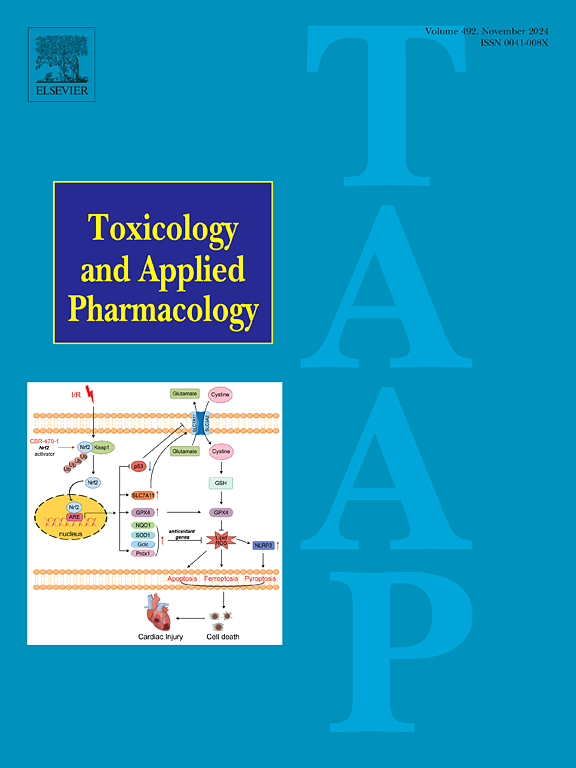表没食子儿茶素没食子酸酯通过CYFIP2 /AKT通路改善视网膜色素上皮细胞损伤。
IF 3.3
3区 医学
Q2 PHARMACOLOGY & PHARMACY
引用次数: 0
摘要
老年性黄斑变性(Age-related macular degeneration, AMD)是一种典型的老年性眼科疾病,其发病机制尚不清楚。本研究旨在确定表没食子儿茶素没食子酸酯(EGCG)是否能缓解AMD的进展及其可能的机制。我们构建三组小鼠(年轻、年老和EGCG),分别对视网膜组织进行HE和TUNEL染色,观察视网膜色素上皮(RPE)层结构变化和细胞凋亡水平。通过视网膜组织rna测序分析、RT-qPCR、GO、KEGG和文献分析,我们确定细胞质脆性X智力迟钝1-相互作用蛋白2 (CYFIP2)可能是EGCG作用的效应基因,并通过免疫荧光和western blotting实验验证了其作用。CCK-8和Hoechst 33342细胞凋亡实验以及western blotting和qRT-PCR检测显示,EGCG可降低过氧化氢(H2O2)诱导的成人RPE (ARPE-19)细胞的凋亡,Cyfip2的表达也随之改变。RNA干扰分析表明,Cyfip2敲低可减轻h2o2诱导的ARPE细胞凋亡,而其过表达可减弱EGCG的保护作用。Western blot分析显示,Cyfip2通过调节ARPE细胞中蛋白激酶B (Akt)磷酸化水平介导EGCG的抗凋亡作用,且EGCG喂养组视网膜组织中磷酸化Akt (p-AKT Ser473)的激活水平高于老龄组。综上所述,本研究提示EGCG通过Cyfip2/AKT通路在AMD的发生和ARPE细胞的凋亡中发挥保护作用。本文章由计算机程序翻译,如有差异,请以英文原文为准。

Epigallocatechin gallate ameliorates retinal pigment epithelial cell damage via the CYFIP2 /AKT pathway
Age-related macular degeneration (AMD) is a representative age-related ophthalmic disease, and the pathogenesis of AMD remains unclear. This research intended to determine whether epigallocatechin gallate (EGCG) could alleviate the progression of AMD and the possible mechanism. We constructed three groups of mice (young, aged, and EGCG), and HE and TUNEL staining of retinal tissues was performed to observe the structural changes in the retinal pigment epithelial (RPE) layer and the level of apoptosis, respectively. Through RNA-Sequencing analysis of retinal tissues and by RT-qPCR, GO, KEGG, and literature analyses, we identified cytoplasmic fragile X mental retardation 1-interacting protein 2 (CYFIP2) as a possible effector gene for EGCG action and validated its role by immunofluorescent and western blotting experiments. The CCK-8 and Hoechst 33342 apoptosis assays, and western blotting and qRT-PCR assays showed that EGCG reduced hydrogen peroxide (H2O2)-induced apoptosis in adult human RPE (ARPE-19) cells, and the expression of Cyfip2 was changed accordingly. RNA interference analysis indicated that Cyfip2 knockdown alleviated H2O2-induced ARPE apoptosis, while its overexpression weakened EGCG's protective effect. Western blot analysis showed that Cyfip2 mediated the anti-apoptotic effect of EGCG by modulating the level of protein kinase B (Akt) phosphorylation in ARPE cells, and the activation level of phosphorylated AKT (p-AKT Ser473) in retinal tissue of the EGCG-fed group was higher than that of the aged group. Taken together, this study suggests that EGCG plays a protective role in the development of AMD and the apoptosis of ARPE cells through the Cyfip2/AKT pathway.
求助全文
通过发布文献求助,成功后即可免费获取论文全文。
去求助
来源期刊
CiteScore
6.80
自引率
2.60%
发文量
309
审稿时长
32 days
期刊介绍:
Toxicology and Applied Pharmacology publishes original scientific research of relevance to animals or humans pertaining to the action of chemicals, drugs, or chemically-defined natural products.
Regular articles address mechanistic approaches to physiological, pharmacologic, biochemical, cellular, or molecular understanding of toxicologic/pathologic lesions and to methods used to describe these responses. Safety Science articles address outstanding state-of-the-art preclinical and human translational characterization of drug and chemical safety employing cutting-edge science. Highly significant Regulatory Safety Science articles will also be considered in this category. Papers concerned with alternatives to the use of experimental animals are encouraged.
Short articles report on high impact studies of broad interest to readers of TAAP that would benefit from rapid publication. These articles should contain no more than a combined total of four figures and tables. Authors should include in their cover letter the justification for consideration of their manuscript as a short article.

 求助内容:
求助内容: 应助结果提醒方式:
应助结果提醒方式:


